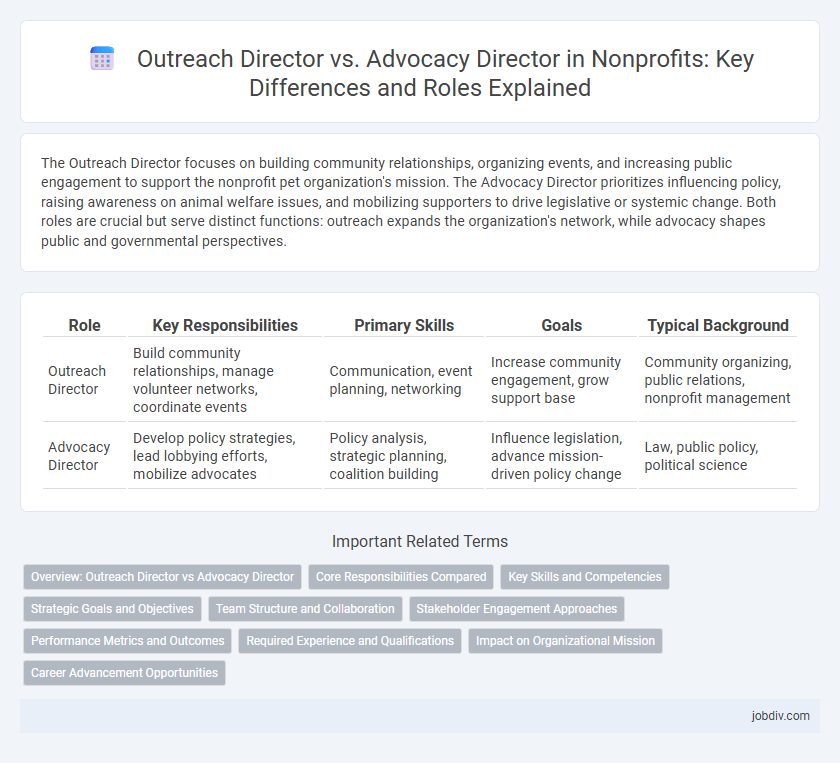The Outreach Director focuses on building community relationships, organizing events, and increasing public engagement to support the nonprofit pet organization's mission. The Advocacy Director prioritizes influencing policy, raising awareness on animal welfare issues, and mobilizing supporters to drive legislative or systemic change. Both roles are crucial but serve distinct functions: outreach expands the organization's network, while advocacy shapes public and governmental perspectives.
Table of Comparison
| Role | Key Responsibilities | Primary Skills | Goals | Typical Background |
|---|---|---|---|---|
| Outreach Director | Build community relationships, manage volunteer networks, coordinate events | Communication, event planning, networking | Increase community engagement, grow support base | Community organizing, public relations, nonprofit management |
| Advocacy Director | Develop policy strategies, lead lobbying efforts, mobilize advocates | Policy analysis, strategic planning, coalition building | Influence legislation, advance mission-driven policy change | Law, public policy, political science |
Overview: Outreach Director vs Advocacy Director
An Outreach Director manages community engagement by building relationships, coordinating events, and increasing awareness of the nonprofit's mission. An Advocacy Director develops strategies to influence public policy, mobilize supporters, and drive legislative change aligned with the nonprofit's goals. Both roles are critical, with Outreach focusing on expanding the organization's reach and Advocacy concentrating on shaping policy outcomes.
Core Responsibilities Compared
The Outreach Director focuses on building relationships with community members, organizing events, and increasing public engagement to expand the nonprofit's support base. The Advocacy Director is responsible for developing policy initiatives, lobbying government officials, and mobilizing stakeholders to influence legislation aligned with the organization's mission. Both roles are critical in advancing the nonprofit's goals but differ in their approach: outreach emphasizes community connection, while advocacy centers on policy change.
Key Skills and Competencies
Outreach Directors excel in community engagement, event planning, and partnership development, demonstrating strong interpersonal and communication skills to expand the nonprofit's reach. Advocacy Directors focus on policy analysis, strategic campaigning, and stakeholder mobilization, requiring expertise in legislative processes and persuasive advocacy techniques. Both roles demand leadership, collaboration, and a deep understanding of the nonprofit's mission to drive impact effectively.
Strategic Goals and Objectives
An Outreach Director focuses on expanding community engagement and building partnerships to increase the nonprofit's visibility and support base. An Advocacy Director prioritizes influencing public policy and mobilizing stakeholder action to drive systemic change aligned with the organization's mission. Both roles align their strategic goals to advance the nonprofit's impact but differ in targeting external awareness versus policy-driven outcomes.
Team Structure and Collaboration
The Outreach Director leads community engagement teams to build partnerships and expand the nonprofit's network, focusing on direct communication and event coordination. The Advocacy Director heads policy and influence strategies, coordinating with legal experts and campaign managers to drive legislative change and public awareness. Effective collaboration between these directors ensures alignment of grassroots efforts with advocacy goals, optimizing resource use and amplifying the organization's overall impact.
Stakeholder Engagement Approaches
Outreach Directors prioritize broad community engagement through events, partnerships, and public education campaigns to expand awareness and support for the nonprofit's mission. Advocacy Directors focus on mobilizing stakeholders by shaping policy initiatives, organizing grassroots lobbying, and coordinating direct action efforts to influence legislative and systemic change. Both roles employ targeted communication strategies, but Outreach emphasizes inclusivity and relationship-building, while Advocacy centers on strategic influence and stakeholder mobilization.
Performance Metrics and Outcomes
Outreach Directors drive community engagement by measuring event attendance, volunteer recruitment rates, and social media reach to boost organizational visibility and support growth. Advocacy Directors focus on policy impact, tracking legislative changes influenced, stakeholder partnerships formed, and successful campaigns to advance the nonprofit's mission. Both roles rely on data-driven performance metrics to evaluate effectiveness but target distinct outcomes: community connection versus systemic change.
Required Experience and Qualifications
Outreach Directors typically require experience in community engagement, public relations, and event coordination, with strong interpersonal and communication skills to build partnerships and increase program visibility. Advocacy Directors need a background in policy analysis, grassroots organizing, and campaign management, often holding a deep understanding of legislative processes and stakeholder mobilization. Both roles generally demand leadership abilities, strategic planning expertise, and a commitment to the nonprofit's mission, but Advocacy Directors usually require more specialized experience in advocacy and lobbying efforts.
Impact on Organizational Mission
The Outreach Director drives community engagement and builds partnerships essential for expanding the nonprofit's reach and resource base, directly enhancing program delivery and visibility. The Advocacy Director focuses on policy change and influencing public opinion, shaping systemic reforms that align with and amplify the organizational mission. Both roles synergize to increase impact, with outreach fostering grassroots support and advocacy securing long-term structural shifts.
Career Advancement Opportunities
Outreach Directors specialize in building community relationships and expanding program participation, which enhances skills in stakeholder engagement and project management, paving the way for roles in community development or nonprofit leadership. Advocacy Directors focus on policy change and public campaigns, developing expertise in legislative processes and strategic communications that can lead to senior policy advisor or executive director positions. Both career paths offer advancement opportunities by deepening organizational impact and expanding professional networks within the nonprofit sector.
Outreach Director vs Advocacy Director Infographic

 jobdiv.com
jobdiv.com